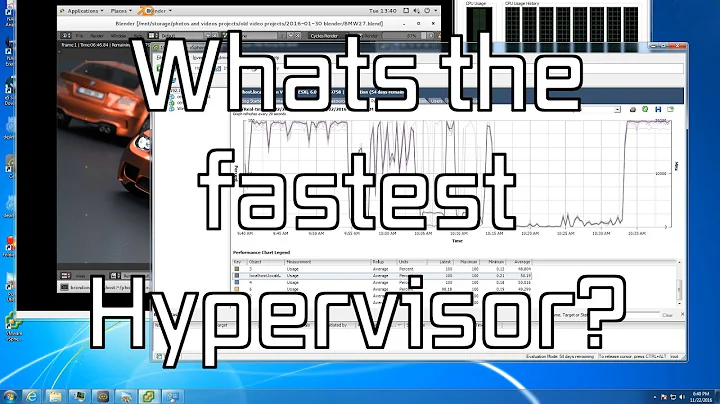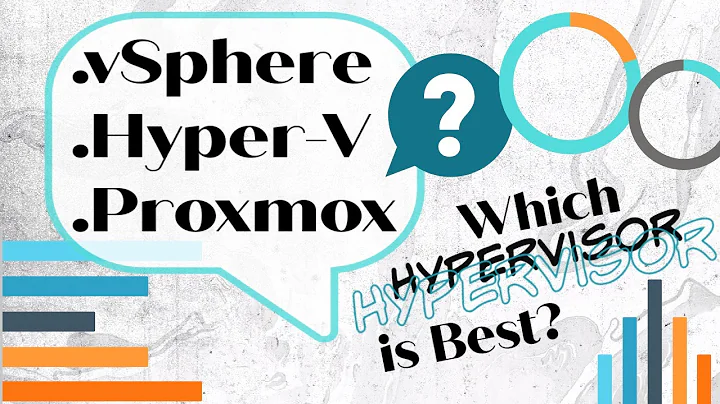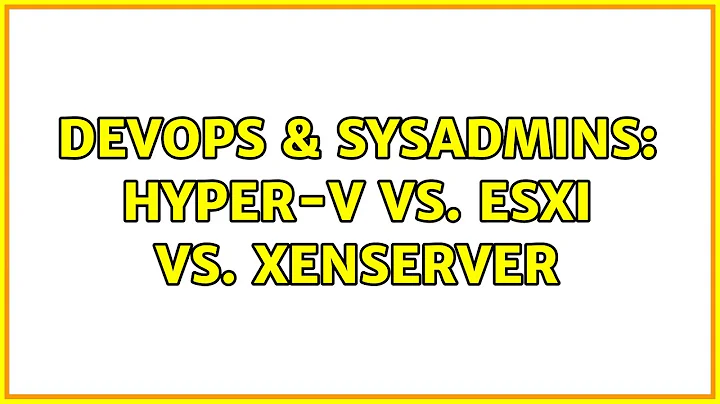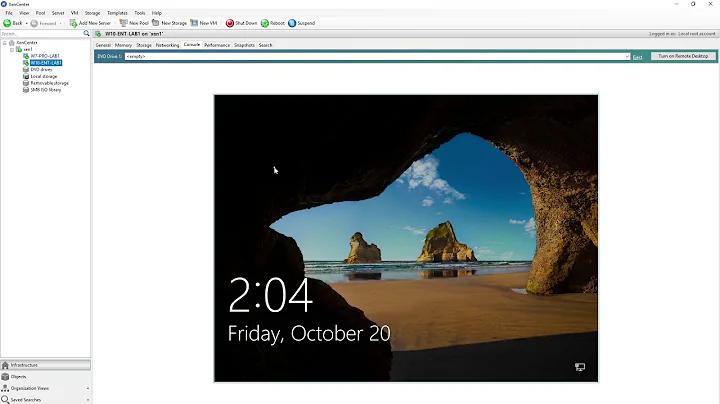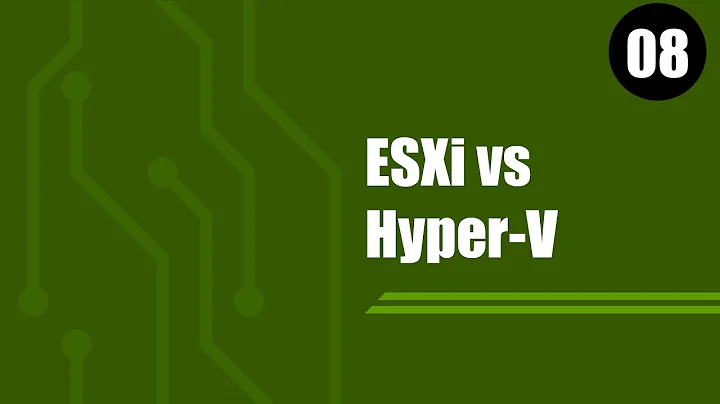Hyper-V vs. ESXi vs. XenServer
Solution 1
I recently took all three for a spin to run my home network, and the short answer is that it depends on your particular needs. Unless your needs are very specialized (database/Exchange/etc), modern hardware with virtualization support you will run the guests with negligible performance differences. Given that I'd suggest looking at features & price.
VMware: As you're probably aware VMware is the long-standing king of virtualization. It has the biggest list of compatible guest OSs, and has one significant unique feature - memory overcommit (you can allocate more virtual memory than there is physical memory). If your goal is to consolidate a bunch of small, underutilized servers VMware will likely give you more VMs/host than anything else. The caveat is that if you overcommit and the VMs need more resources performance tanks. ESX/ESXi also has the smallest list of compatible hardware. If you are looking at a white-box system, check here first. If you have compatible hardware it's fairly easy to install and use. The free version (ESXi) comes with hardly any features, which is fine if you're looking for a few standalone hosts, and the non-free versions are priced out of this world. On a personal note, I VMware leaves a nasty taste in my mouth - in my mind they are one of the many companies resist change & innovation when the very foundation of their business is challenged by the competition. Recently they asked a partner company to remove their product's support for the free version.
Microsoft: Hyper-V is a very intriguing option, even more with the R2 version. I tested Hyper-V Server, which is the free standalone product. I'm a Microsoft fan, and I really wanted to like Hyper-V, primarily because it can run on practically any hardware that has Windows drivers. If you are running in a domain environment and primarily use Windows, Hyper-V should be at the top of your list. When you have the option to buy/use SCVMM it appears to be an even better value. Unlike VMware, the free version comes with a good feature set and is even better in R2, where clustering & live migration are available! Hyper-V runs Windows guests very well, has a small, but growing, list of supported Linux guests, and even unenlightened Linux guests seem to run reasonably well. The story is different if you aren't in a domain environment as managing the standalone Hyper-V Server is a major pain. Despite all of the goods Microsoft delivered in a v1 product, the management was driving me crazy.
Citrix: The end result of my testing was to go with XenServer 5.5. It has IMHO the best set of features and capabilities of the three free offerings. Like VMware it is installed and managed like an appliance rather than an operating system (like Hyper-V). It also has a much larger list of compatible hardware (and I suspect the ability to add drivers if needed). It offers way more features than VMware's free offering, and if you were to upgrade the free version to the paid version would cost much, much less. Windows guests are well supported, but Linux guests are, well, not what you'd expect from a Linux-based virtualization platform. Its list of supported Linux guests is quite small compared to VMware and non-supported Linux guests don't seem to run well at all. Ubuntu is noticeably lacking from the list. Overall for home use I felt that it had the best bang for the buck.
Solution 2
I thought Xen was a free virtualization platform for Linux...is there a Xen and a separate XenServer platform?
Yes and confusion is common.
- Xen - The HyperVisor that sits behind the scenes.
- XenSource - The open source virtualisation project/solution now owned by Citrix.
- XenServer - The closed source virtualisation product produced by Citrix.
Solution 3
Quite general what your asking however these are three very big products in the virtualization world, and all offer trail periods i'd advise on taking out testing them on some spare hardware. I can give you my experiences of what I know in the three but would be nice to hear from others too
VMware vSphere 4 First off it's the market leader, and has great dominence over the lot. I costs more but depends what your looking for. ESX (ESXi or ESX HD install) as a single managed host is free. You pay for clustering and management features, HA, DRS+DPM, FT This gives a good comparison vSphere Compare
Other advantages i've found is the CLI and API options. it's endless the amount of automation and support for a large user community. Lots of plug-in's to chose from too.
Citrix XenServer This I'd second as Citrix are great for desktop delivery, and I guess XenServer will be a power product for there suite of stuff. yet to test it. just need to find time but so far it looks neat. It's based on the free Xen.org so it will have a growing user community behind it. This is also on my evaluation list, however ours own IT use it for production VM's, will have to get there views.
MS Hyper-V As MS know they have to enter this industry it eventually mature and match the feature of it's competitors. I'\ve yet to test this hypervizor out.
As regards testing. Make sure you have large servers, 2xQuad CPU's 8GB+ RAM, iSCSI or FC SAN makes a huge difference to test on decent hardware.
Hope that helps ;)
Solution 4
Cost: XEN and Hyper-V are likely going to be cheaper products in the short run.
Storage compatibility: You really want a decent SAN to drive your storage.
Tools: VMware is king here. VirtualCenter, Lab Manager, LifeCycle Manager, Backup Assistants. Citrix/Xen is only just starting to build tools of this functionality (although the VMware tools CAN be horribly buggy at times).
Solution 5
Everyone's comments so far are on par with my own experiences. ESXi is a great (free) intro into the VMWare platform. I'd also recommend XenServer 5.5 and XenCenter, both free from Citrix. I currently use Citrix XenServer 5.5 at home and it runs extremely well and XenCenter makes administration so easy. I've been very impressed with the product as a direct competitor to VMWare's product line.
In terms of cost, VMWare is the most expensive but the most mature and stable platform. I'd say Citrix is next in pricing, and MS last as they're practically giving away (~$30?) Hyper-V.
And as usual features come with a price tag. More $$$, more features so I'd say for you maybe the better tactic is to investigate what you think you need first. Then list out features you want. Then work from there, and investigate solutions. Anything extra should be noted.
Opinions and observations would be appreciated for a test rollout for our organization.
So it sounds like your organization is trying to test out the waters. If testing the waters is all you can do, start with price. ESXi 4.0 and/or Citrix XenServer 5.5. If you're strictly running a Microsoft platform, I would recommend Hyper-V as an alternative.
Related videos on Youtube
user1364702
Sysadmin, Assister for Users of Technology, Writer of Words, and Flixer of Nets
Updated on September 17, 2022Comments
-
user1364702 over 1 year
Can anyone share their experiences (for example, this was great! This failed miserably!) with using the Hyper-V, ESXi, and XenServer virtualization platforms? Cost? Management? features? Handling load and backups and recovery?
And also minimum server requirements?
I thought Xen was a free virtualization platform for Linux. Is there a Xen and a separate XenServer platform?
Opinions and observations would be appreciated for a test rollout for our organization.
-
Jeff Hengesbach almost 15 yearsEach of these solutions has it's pros and cons. If you could mention your requirements / scale you may get a more valuable answer. Google will supply you with lots of 'comparisons' but by supplying a real situation folks can give you the specifics that go beyond the typical Google result.
-
user1364702 almost 15 yearsI've been googling and reading about them, what I mainly wanted was to hear a reaction from other admins that had tried using them. I.e., we can all read about how wonderful RAID is, but I had a hardware RAID 5 go bad when a drive died and wouldn't rebuild with a new one because another drive had one bad block on it that never triggered an alert on the controller...hoped to find similar anecdotes here that aren't found in the literature, so to speak.
-
Jeff Hengesbach almost 15 yearsThanks for the reply Bart. Where I was going is that if you are only talking about a handful of VM's on 1-2 physical hosts, any of the solutions will work for you. They begin to differentiate when the requirements move to advanced management functions, high availabitliy, seciruty, types of more extreme workloads, current administrators / environment preference (Windows vs linux really).
-
user1364702 almost 15 yearsI prefer being able to experiment with home network setups, which means that the more $$ the worse for me, but at our organization we're currently moving Windows XP/2000/2003 based systems (printer/file sharing mostly) and a Linux web server (bulletin board, internal use) to a system. The hardware has 16 gig RAM, 2 4-core processors, gigabit ethernet (dual gigabit but don't know if there's support for bonding them on a hypervisor). Our current vm server has four lightly-used systems on it with a few more scheduled to be migrated over (using EXSi).
-
ptman almost 13 yearsDon't forget RHEV (redhat.com/virtualization/rhev) or Ubuntu KVM with ganeti
-
 Lester Cheung almost 13 yearsNote that this question (and its answers dated back in 2009). All protects have improved dramatically since then. I'd suggest tabulating your requirement in a table and do the research/scoring on your own to narrow down choices. I did and it worked for me everytime!
Lester Cheung almost 13 yearsNote that this question (and its answers dated back in 2009). All protects have improved dramatically since then. I'd suggest tabulating your requirement in a table and do the research/scoring on your own to narrow down choices. I did and it worked for me everytime!
-
-
user1364702 almost 15 yearsWith Hyper-V don't you have to license Server 2008?
-
osij2is almost 15 yearsI don't work with Hyper-V on a regular basis so I can't answer your question accurately. Microsoft's website may be a better source than me for licensing: microsoft.com/windowsserver2008/en/us/hyperv-faq.aspx
-
user1364702 almost 15 yearsSo purchasing 2 licenses of Server 2008 will allow live migration of VM's between two machines? Is there a catch?
-
 MDMarra almost 15 yearsWhy not use ESXi in production? VMWare is pushing ESXi as their primary hypervisor and I have seen ESX listed as "supported for legacy customers" in more than one of their documents.
MDMarra almost 15 yearsWhy not use ESXi in production? VMWare is pushing ESXi as their primary hypervisor and I have seen ESX listed as "supported for legacy customers" in more than one of their documents. -
Helvick almost 15 yearsHyper-V Server 2008 is free - Details here microsoft.com/downloads/… . You need to accept the license terms, it is closed but you don't have to pay for stand alone Hyper-V.
-
Helvick almost 15 yearsYou need to purchase either Enterprise of Datacenter Edition of 2008 R2 to support it - the basic requirement is that you set up a failover cluster first. This will require shared storage too.
-
Helvick almost 15 yearsFully agree - there is no reason not to use ESXi in production but I would still advice that it be fully licensed in order to avail of support. And as you say VMware have said that they are moving to a Hypervisor based on ESXi rather than ESX in future.
-
osij2is almost 15 yearsGuess they're giving it away for free now. If you can't beat 'em, give it away!
-
Lotus almost 15 years"JUST gone RTM". Vmware has been doing live migration since Y2K. I'll stick with the proven product, thank you very much.
-
Govindarajulu almost 15 years@Rcihard, tell me, is that the real thing, without having to use a LUN per VM or without having to failover all VM's on a LUN? Because that is / has been a bit of a problem, isn't it? Afaik, Hyper-V can do some sort of Live Migration, but it is a bit of a hack, since machines are shortly suspended during migration. And then still, because of the usage of NTFS, you either have to place a VM on a LUN by itself, or migrate all VM's on a LUN. NTFS is not a cluster file system, after all. Or at least, so I heard :P
-
Ketan almost 15 yearsIt's worth adding that xen is not linux, nor is it a virtualisation platform for linux. It's just a hypervisor. There is a codebase to allow linux to be the dom0 admin/IO domain and this is the norm. But you can also have other OS as dom0 e.g. open solaris
-
osij2is almost 15 yearsI agree; XenServer 5.5 has the best set of features that are free out of the box. Overall a great summary on the product OEMs themselves too.
-
Atulmaharaj over 14 yearsInstead of using the Xen hypervisor that is supplied with many Linuxes, I would recommend you try XenServer, which is a bare-metal hypervisor and much more comparable to VMware that way.
-
Govindarajulu over 14 years@Martijn Heemels: Xen is Xen, no matter how you call it or how you look at it.
-
Scott Forsyth over 14 yearsIf your guest OSes are non-Windows, it's complete free. If you use Windows, then you need to license the guest operating systems. Or, if you license Windows Standard, you get to install it as the host and guest with the single license, or Enterprise edition allows 4 guests, and DataCenter edition allows unlimited guests. Not everyone realizes it, but the same licensing applies to VMWare and XenServer too. For example, 1 license of Enterprise allows up to 4 guests on the same host.
-
Scott Forsyth over 14 yearswzzrd, with R2, Microsoft has released CSV (Clustered Shared Volumes) which allow a single volume which multiple VMs can use, and fail over independently. Multiple machines can see the same LUN at the same time, although it's always locked to a single host. This sits on NTFS, although CSV cannot be used for anything except for Hyper-V at this time.
-
Govindarajulu over 14 years@Scott, I read a bit about that and the whole 'we write block data ourselves, but meta data via a single host' sounds apeshit scary to me. I'll admit it's a big step forwards though... But we're still not going to use it ;-)
-
Dscoduc over 14 yearsCan't understand the issues with non-domain joined Hyper-V... been using it for some time without any problems...
-
Dscoduc over 14 yearsSo basically you have only tested the VMware product?
-
Dscoduc over 14 years@darthcoder - Yeah, those Microsoft guys don't know anything about virtualization... Stay away from that crappy Hyper-V product... ;-)
-
Dscoduc over 14 years-1 - 'The technology just isn't mature enough yet.' - Really? what do you base that opinion on? You say yourself that you have no experience with Hyper-V and you don't provide any info that indicates there have been problems with this immature product...
-
Govindarajulu over 14 years@dscoduc I'm pretty sure I gave some reasons I would shy away from using it, both in the post as in the comments, but you're free to ignore my advice.
-
John Clayton over 14 years@Dscoduc - Just personal preference more than anything. Sure Hyper-V works without a domain, but if you ever wanted to take advantage of the higher-end features you get for free with Hyper-V Server (CSV, Live Migration, etc) you do need a domain. With XenServer you get those kind of high-end features without needing a domain and with the ease of an appliance.
-
jds950 almost 13 yearsLove citrix XenServer. The XenCenter console is a great product. Makes everything easy to manage. Can't go wrong with XenServer. Xen is a free product and in some cases has some more features as Citrix bases their XenServer product on Xen and contributes quite alot to the Xen project, sometimes working in tandem. If you go with Xen there is an open source project that copied the Citrix XenCenter project. I would recommend it. openxenmanager.com
